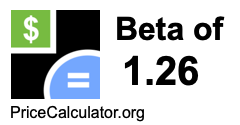
Here we will explain what a 1.26 beta coefficient of a stock means and how it can help investors make informed decisions. We have also included a 1.26 beta calculator so you can easily calculate the potential price change of your stock based on market changes.
First of all, a beta coefficient of a stock indicates how much the price of the stock varies compared to the whole stock market. In other words, beta is a measurement of a stock's volatility.
A beta of 1.26 means that if the market goes up 1 percent, a stock with a beta of 1.26 will go up 1.26 percent. Inversely, if the market goes down 1 percent, a stock with a beta of 1.26 will go down 1.26 percent.
Therefore, a stock with a beta of 1.26 has more volatility than the market as a whole. The stock goes up or down more than the market as a whole.
Since a stock with a beta of 1.26 has more volatility than the overall market, it means that the stock is more risky than the market. It also means that a stock with a beta of 1.26 has a greater potential for gain or loss compared to the market as a whole.
Below is our 1.26 beta calculator. It can estimate how the price of a stock with a beta of 1.26 will change based on how the market changes. To use this calculator, enter the current price of a stock with a beta of 1.26 and the percentage change of the market.
The percentage change can be the actual change (S&P 500 is commonly used), or what you think it will be in the future. For a negative change, use the minus symbol (-) before the percentage.
Important Note: A beta of 1.26 is derived from historical data and there is no guarantee that history will repeat itself. Happy investing!
Stock Beta Meaning
A beta of 1.26 is not all we have information about. Enter another beta value for a stock to see what it means!
What does a beta of 1.27 mean?
Here is more beta information for you. Check it out!
Contact | Disclaimer | Copyright | Privacy
